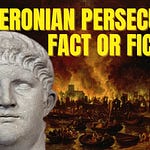
Mike Winger is a US pastor with a YouTube channel called Learn to Think Biblically.
While he covers a lot of topics, some of it is quite good, he is best known for his massive 80+ hours of videos on Complementarianism.
Now Complementarianism, with many variations, is a view that authority and teaching roles in the church such as the offices of pastor and elder are exclusively the remit of men.
I’ve known about Mike Winger for a while, I knew he was popular in American evangelical circles, but I underestimated how global his audience is.
I made a video with Andrew Bartlett and Terran Williams about Mike Winger’s Complementarianism and I was blown away by the huge number of views it received and the large number of very, very strongly worded comments it got. (Also, read Terran Williams for his point-by-point engagement with Mike Winger.)
I discussed this with someone at my church who informed me that many young people in our congregation have been watching Mike Winger videos. Some stuff he produces is quite good, but on women and church, I hope they have a broader diet.
That’s when I decided that I needed to pay a bit more attention to him and, along with others, offer an alternative to the views about women in the church that he is disseminating.
Now Winger is not the most extreme or restrictive Complementarian around. He’s moderate in many senses, especially when it comes to women’s ministry outside of church contexts. He disavows a patriarchialist position a lot of the time. But he is still advocating for a position that restricts women from church ministry and does not represent a biblical practice for today that I would endorse.
I am not going to provide 200K words or 200 hrs of content responding to Mike Winger’s 80 hrs of videos on women, wives, marriage, authority, and the church. But I am going to do several posts and videos responding to key elements of Mike Winger’s particular species of Complementarianism to get an alternative position out there and for my own students. I am going to focus mainly on Winger’s take on 1 Tim 2:11-15.
Clearing the Deck for a Study of 1 Timothy 2
So let’s prepare ourselves for what is to come in a study of 1 Timothy 2:11-15.
Pauline authorship of the Pastoral Epistles including 1 Timothy is disputed. The problem is that parts of the Pastoral Epistles sound naturally Pauline, but other parts sound like someone eulogizing Paul and using terminology from a later generation. Now you could say that these letters are pseudonymous, even forgeries, written in the second century, many scholars take such a view. Alternatively, you could retort that Paul used a secretary and simply had the help of co-workers in most letters. You could point out too that stylistic analysis makes 2 Timothy more authentically Pauline than 2 Corinthians in terms of common vocabulary and expression of ideas. I take the view that the Pastoral Epistle are based on fragments of Pauline letters that have been edited and revised by a Pauline companion like Luke or someone in the Pauline circle. See more on this in The New Testament in its World, where Tom and I go into depth on this issue.
But for now, let’s assume Pauline authorship or at least that someone, like Luke, is working with fragments of authentic Pauline correspondence.
Let’s lay the groundwork for a study of 1 Timothy 2:11-15.
The letter begins with Paul greeting Timothy and then, in 1 Timothy 1:3-11, he goes into a warning about false teaching. That’s the first topic discussed.
I won’t go into much depth on this, but I think the false teaching here is a type of proto-Gnostic view that has begun to emerge in Jewish circles and is gaining attention and adherence in the Ephesian churches. What indicates that are four things:
The false teaching is based on the interpretation of the Torah, and Gnostics engaged in spiritual and cosmological exegesis of Genesis.
The false teaching is characterized by myths, endless genealogies, and speculations, of which we don’t know in detail, but later Gnostics also had a big interest in speculative cosmology about the pleroma, Sophia, the demiurge, and such things.
At the very end of the letter, Paul warns about “what is falsely called knowledge,” which is a very Irenaean way of referring to Gnosticism (1 Tim 6:20).
I wonder if the false teaching in Ephesus that Paul warns about is similar to a scheme that the Jewish Christian author Hegessipus spoke about according to Eusebius which had Gnostic qualities.
Also, 1 Timothy ends with another warning about false teaching in 1 Tim 6:2-10, so false teaching really is the major issue, not gender hierarchy.
This proto-Gnostic heresy might not be the presenting issue in 1 Timothy 2, but it does show that Paul is very sensitive to anything that detracts from “the faith” that Timothy has received and is called to defend.
Now, looking at 1 Timothy 2, it breaks down into two parts: Political Faith (vv. 1-7) and house church/household context (vv. 8-15).
Here’s a translation of vv. 8-15.
8 Therefore, I want the men in every place to pray, lifting up holy hands without anger or argument. 9 Also, the women are to dress themselves in modest clothing, with decency and good sense, not with elaborate hairstyles, gold, pearls, or expensive apparel, 10 but with good works, as is proper for women who profess to worship God. 11 A woman is to learn quietly with full submission. 12 I do not allow a woman to teach or to have authority over a man; instead, she is to remain quiet. 13 For Adam was formed first, then Eve. 14 And Adam was not deceived, but the woman was deceived and transgressed. 15 But she will be saved through childbearing, if they continue in faith, love, and holiness, with good sense. (CSB)
When it comes to applying 1 Tim 2:11-15, there are different types of Complementarianism. Some permit women to teach in a seminary and lead in a para-church organization. Others permit women to preach in church under the supervision of a male senior pastor or male eldership. Some species of Complementarianism even ordain women and they can do anything except be a bishop or senior pastor. But I want to engage the more thorough-going Complementarianism of Mike Winger because it is more restrictive and less biblical than it appears to be.
My Thesis
Similar to the situation in Corinth where gender roles in the Greco-Roman world were causing controversy in the Corinthian house churches – related to prophecy and head coverings – so too here in 1 Timothy, Paul urges Timothy to address a local situation in Ephesus. The backstory is that some wives were disturbing households and house churches by badgering their husbands with bad ideas, they were perhaps under the influence of some proto-Gnostic teachings related to myths and asceticism, and these same women had yet to fully disengage themselves from their inherited religious culture in Ephesus, principally the cult of Artemis, which is why they needed to be better instructed. Consequently, the prohibition on a woman (or wife) teaching and usurping authority over a man in 1 Timothy 2 is local and specific rather than universal and timeless. The smoking gun is 1 Tim 2:15, a clear allusion to the Artemis cult because Artemis was the goddess of childbirth.
In addition, if the prohibition about women leading and teaching was universal and timeless, then the rest of the Old Testament and New Testament does not make any sense because women did lead, teach, and prophesy. The price of maintaining a hard complementarian application of 1 Timothy 2:12 – where women can never lead or teach men in the church, in mixed assemblies, or at Bible study – is an unceasing festival of tortured exegesis because you have to engage in acrobatic interpretive moves to explain away Deborah (Judges 4-5), Huldah (2 Kings 22:14; 2 Chron 34:22), female prophets in the early church (Acts 21:9, 1 Cor 11:5), Priscilla (Acts 18:6; Rom 16:3; 2 Tim 4:19), Phoebe (Rom 16:1-2), Nympha (Col 4:15), Junia (Rom 16:7), plus evidence from non-Christian sources and from early Christian art about women serving in the church. We do better to see women in the Pauline circle operating as benefactors, delegates, apostles, prophets, office-holders, co-workers, house church leaders, and fellow-prisoners for the gospel.
That is what I am going to argue over and against Mike Winger’s thorough but unfortunately mistaken analysis of 1 Timothy 2:11-15.










